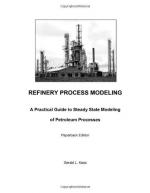|
This section contains 5,725 words (approx. 20 pages at 300 words per page) |

|
The process of refining begins with the delivery of crude oil—a mixture of thousands of different hydrocarbon compounds that must be separated into fractions of varying boiling ranges in order to be used or converted into products such as gasolines, diesel fuels, and so on. Crude oils from different sources vary widely in terms of density (gravity), impurities (sulfur, nitrogen, oxygen, and trace metals), and kinds of hydrocarbon compounds (paraffins and aromatics). In general, the heavier the crude oils, the less transportation fuel (gasoline, diesel fuel and jet fuel) boiling-range components are contained in the crudes. The average crude oil charged to U.S. refineries in 1998 contained about 20 percent material in the gasoline boiling range and about 25 percent in the middle distillate (diesel and jet fuel) boiling range. The U.S. market requirements are about 50 percent gasoline and 35 percent middle distillate fuels per barrel of crude oil...
|
This section contains 5,725 words (approx. 20 pages at 300 words per page) |

|


